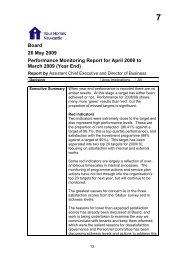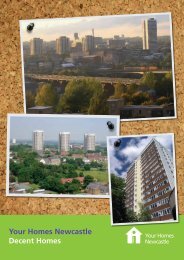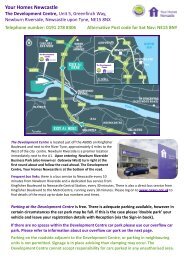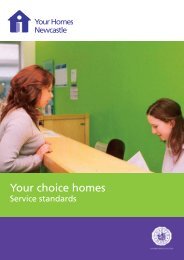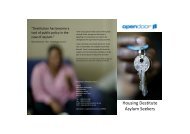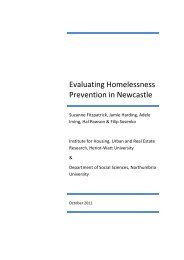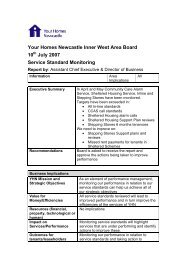Thinking of Buying a Council Flat
Thinking of Buying a Council Flat
Thinking of Buying a Council Flat
- No tags were found...
You also want an ePaper? Increase the reach of your titles
YUMPU automatically turns print PDFs into web optimized ePapers that Google loves.
<strong>Thinking</strong> <strong>of</strong> buying a council flat?Things to consider before you buy a flat where the freeholderis a council, housing association or other social landlord.housing
<strong>Thinking</strong> <strong>of</strong> buying a council flat?Are you thinking <strong>of</strong> buying a flat from a local authority, a housingassociation or another registered social landlord? Perhaps under theRight to Buy, or some other scheme? Or are you thinking <strong>of</strong> buyingone <strong>of</strong> these flats on the open market?This leaflet tells you some things you should consider.Around 200,000 people have bought a flat from a council or housingassociation. Most are happy with their purchase. If you buy, wewant you to be one <strong>of</strong> them.But some people have had to pay high service charges or have beenunable to resell their flat. Many <strong>of</strong> them did not realise whatobligations they were taking on when they bought. We don’t wantyou to be one <strong>of</strong> them.This is not an authoritative guide to the law. You should get independentlegal advice before you decide whether to buy a flat. It may be the biggestdecision you ever make.
ContentsThings to consider before you buy 2What am I buying? 2What legal obligations am I taking on? 2What will I have to pay for? 3How much will these services cost? 4What else may I have to pay for? 5What are my rights after I buy? 6Will I be able to resell later? 6Possible problems and where to seek help 8Service charges: disputes 8Service charges: difficulty in paying 9Mortgage: difficulty in keeping up repayments 9Resale problems 9Think before you buy 11Further information 12Some commonly-used terms explained 12Other booklets you may need 13Useful addresses 15Chart to help you decideInside back cover1
Things to consider before you buyWhat am I buying?<strong>Flat</strong>s are not usually sold freehold. They are usually sold on a longlease, <strong>of</strong>ten 125 years. This gives you the right to live there duringthis period. You may sell the flat during this time. If you are buying aflat from a council, housing association or another social landlord,they will normally own the land and building, and will be your landlord.Our leaflet Long leaseholders, your rights and responsibilities (see FurtherInformation) tells you more about this.What legal obligations am I taking on?The lease sets out your obligations to the landlord, and your rights.For example, it says what the landlord has to do to maintain thebuilding, how you have to pay for it, and how you have to maintainthe inside <strong>of</strong> your flat.You will be sent a copy <strong>of</strong> the lease to read. Check it carefully, andask a lawyer to advise you. But do not just leave it to the lawyer: youshould read the draft yourself. If anything in the draft seems unfair,ask – and, if necessary, challenge it. Once you have bought the flat,you will be bound by its terms.If you decide to buy, keep a copy <strong>of</strong> the lease so that you can refer to itbefore contacting your landlord about an issue that may be in dispute.2
What will I have to pay for?Normally you will have to pay your share <strong>of</strong> these costs, which aregenerally known as service charges:● The landlord’s cost in maintaining the common parts, structureand exterior <strong>of</strong> the property. These could include repairs to orreplacement <strong>of</strong> the ro<strong>of</strong>, windows, lifts, staircase or external painting.The costs could sometimes be very high – several thousand pounds.● The cost <strong>of</strong> any services provided by the landlord such ascaretaking and day to day maintenance <strong>of</strong> the grounds, lighting forhalls, stairways and footpaths, hot water, central heating etc.● The costs <strong>of</strong> any improvements to the structure, for example theinstallation <strong>of</strong> entry phones or double glazing – if the lease requiresyou to pay for improvements.● The landlord’s management costs and the cost <strong>of</strong> insuring thestructure and outside <strong>of</strong> the flat against accidental damage.Ask the landlord whether there are any estimates <strong>of</strong> the costs. Youshould also ask whether the building has any structural defects, or anyunusual features or materials which could involve you later in repaircosts, or which could affect your health or your ability to resell.Although the decision whether or not to buy must be yours, do talkto your landlord. It can explain what you are taking on. Your landlordmay have produced a guide or booklet for prospective leaseholders inyour area, so ask for a copy. You could also ask other people who havebought a flat in the same block or area. For example, there may be alocal residents’ or leaseholders’ association.If you are buying under the Right to Buy, the Preserved Right toBuy or the Right to Acquire, your landlord has to give you certaininformation. (Details are in Your right to buy your home and Guide toRight to Acquire – see Further Information).3
How much will these services cost?If you are buying under the Right to Buy then, when your landlordhas accepted your application, It will tell you how much the flat willcost and it will provide you with:● Estimates <strong>of</strong> the costs <strong>of</strong> any repairs or improvements which it maycarry out during the first five years. These estimates are binding andcan only be increased in line with inflation. But if any works aredelayed until after the five-year period, you will have to pay thefull cost.● Estimates <strong>of</strong> any other service charges, for example caretaking, hotwater etc. Estimates for these service charges are not binding andcan rise by more than inflation, even during the first five years.Service charges will usually vary from year to year. When you aregiven an estimate for the first five years, do not assume they will stayat that level later. They could go up.Ask the landlord what it is thinking <strong>of</strong> doing to the building – notjust in the first few years, but in the longer term, say, 10 years or more.Even if your landlord has no firm plans, is it considering major works?What, when, and how much could they cost? For example, it mightbe thinking <strong>of</strong> replacing all the windows or the lifts, or doing workoutside, such as installing new estate lighting and footpaths.If you are not buying under the Right to Buy, you should still askthe landlord for estimates, but it is not obliged to provide them andthey are not binding.4
What else may I have to pay for?You should also allow for other costs such as:● Your own costs in maintaining the interior <strong>of</strong> the flat. The lease mayrequire you to do certain things, such as to paint every few years.● Mortgage repayments. If your lender agrees you could add somerepair and improvement costs to your mortgage. But will you beable to keep up the repayments – say, if interest rates go up?● Mortgage protection insurance. Suppose you fell ill or lost yourjob? Could you afford to keep up the payments? It is a good idea toinsure against these.● Life assurance. This would enable your family to pay <strong>of</strong>f themortgage if you die. This is recommended as well.● Contents insurance against the risk <strong>of</strong> fire, flood or other accidentsis also recommended.● <strong>Council</strong> tax and water charges.● Gas, electricity, telephone etc.● Ground rent.Our free booklet Your right to buy your home gives you details andexamples. It also lists the ‘one-<strong>of</strong>f’ costs <strong>of</strong> buying – for example:● you should use a solicitor or licensed conveyancer;● you should have your own independent survey;● you may have to pay to get a mortgage – for example, legal costsand a valuation fee;● the Land Registry fee; and possibly● Stamp Duty.You should work out how much you might have to pay for all thesecosts, and whether you can afford the ‘one-<strong>of</strong>f’ costs in addition tothe costs in the years to come, before you decide whether or not tocontinue with the purchase. Take time over this.5
What are my rights after I buy?Your lease will set out your rights and obligations. But you also haverights under the law.These include:● the right to obtain a summary <strong>of</strong> the relevant costs <strong>of</strong> any servicecharges;● the right to look at the documents on which the summary is based;● the right to be consulted about planned major works;● the right to challenge a charge which you think is unreasonable; and● the right to challenge works or services which you think are not <strong>of</strong>a reasonable standard.These rights take priority – even over the terms <strong>of</strong> the lease.Will I be able to resell later?Your lease should allow this – though you will normally have to repaysome or all <strong>of</strong> the discount if you buy under the Right to Buy or asimilar scheme and resell within five years. The value <strong>of</strong> your homecan go down as well as up.Some people have found their flats difficult or impossible to sell. Forexample, some people in high-rise blocks, system-built blocks or onlarge estates have had difficulty. So before you decide whether to buyor not, it is a good idea to:● Speak to people who already own their flats in the building or onthe estate. You could ask if they have had difficulty selling.● Speak to the landlord who may be able to tell you the number <strong>of</strong>people who have bought flats in a particular block or estate, andwhether any <strong>of</strong> them are having difficulty in selling, or might havedifficulty in the future.● Ask estate agents or surveyors in the area whether your flat wouldbe easy to resell, and how this might be affected by a change in thehousing market.6
Some people have found someone willing to buy, but the buyer has thenbeen unable to get a loan. Before you make your decision you could:● Ask mortgage lenders if they would lend to you or to someone elsebuying from you later. You may be buying at a discount, but youwould want to sell at the full market price. So you could ask thelenders if they would lend to someone buying for the full market price.● Ask whether their decisions are likely to change if the housingmarket changed.Our booklet Your right to buy your home will tell you more about this– even if you are not buying under the Right to Buy.This is not intended to be a complete list. If you talk to some <strong>of</strong> theother people we have mentioned, they may suggest other things youshould think about before you make up your mind.7
Possible problems, and where to seek helpMost people who buy their council or housing association flat considerit good value for money. But some have run into problems. In thissection, we describe some <strong>of</strong> the most common problems and whereyou may be able to get help. It is a good idea to think about thisbefore you buy.Service charges: disputesIf you are not happy with the services you receive, do not considerthem good value for money or you do not understand why you arebeing charged for something, you should try and speak to your landlordas soon as possible, and pay the items which are not in dispute.You might also ask your landlord if there is a local leaseholders’ orresidents’ association. This may be acting for other people in your areawho are unhappy with their services or charges. You can think abouttaking disputed charges to a Leasehold Valuation Tribunal (see FurtherInformation). Your landlord can also take you to a tribunal. TheLeasehold Advisory Service (see Further Information) can give youfree initial advice on your problem.If you do not pay your service charges, and if a Leasehold ValuationTribunal or a court or tribunal decides that the charges are reasonable,your landlord may be able to repossess your home. So, if you have adispute, always seek expert advice, and ask about the risks – especiallyif you are refusing to pay all or part <strong>of</strong> the charge.8
Service charges: difficulty in payingIf you are having difficulty paying your service charges, you shouldspeak to your landlord as soon as possible. You could ask your landlordwhether it is able to give you longer to pay. It can also tell you <strong>of</strong> anylocal hardship schemes. It can <strong>of</strong>ten advise whether you could beeligible for any State benefits. If you bought under the Right to Buy,you may be eligible for a loan from your landlord.However, you should not assume that your landlord will be able to<strong>of</strong>fer financial help. <strong>Council</strong>s, housing associations and other sociallandlords have limited funds and many other people need their help.Mortgage: difficulty in keeping up repaymentsIf you fall behind with your mortgage repayments, you might loseyour home.If you are having difficulty keeping up your mortgage repayments, youshould speak to your lender as soon as possible and ask them whetherthey can give you longer to pay. Do not wait until you are monthsin arrears.Your lender may be able to tell you where to get help. For example, ifyou are unable to work, you may be able to claim State benefits. Butthese will not cover the whole <strong>of</strong> your mortgage repayments.Resale problemsMany people will have no trouble selling their flat. But the housingmarket changes. A flat may be easy to sell one year, but hard to sellanother year.9
If you are unable to sell your home and you badly need to move, youcan talk to your landlord. In a very few cases your landlord may bewilling to buy your flat back or <strong>of</strong>fer to sell you another more suitableproperty in exchange. But you should not rely on this, because thelandlord is under no obligation to buy back the property.If the landlord is willing to buy back the property, you may be <strong>of</strong>feredno more than the flat’s actual value at the time. This may be muchless than you paid for it.10
Think before you buyWe cannot predict all the problems that might come up. So youshould seek independent financial and legal advice before decidingwhether to buy. You could ask people who have bought similar flats.You could also ask your leaseholders’ or residents’ association, or yourlocal estate agents, lawyers or mortgage lenders. You could also askyour local Citizens Advice Bureau whether there are any problems itis aware <strong>of</strong>.● If you are seeking help, ask your advisers whether they haveanything to gain from the advice they give you. Some may callthemselves advisers, but if you buy, they may make money from themortgage loan, or from repair or improvement work. They may beacting quite legally. But if someone advises you to buy – or to borrowmore money than you think you need – it may help you to know why.● Do not pay money for things you can do yourself. Some peoplemay <strong>of</strong>fer to help you through the process (for example, by applyingto your landlord to find out how much your home will cost). Yourlandlord or a Citizens Advice Bureau will probably do this for nothing.Right to Buy application forms are free and delivery need not costyou more than the price <strong>of</strong> a postage stamp, or a bus fare. Do notpay a lot <strong>of</strong> money – or discover later that unnecessary costs havebeen added to your mortgage.● Go back through this leaflet. Have you – or your lawyer or otheradviser – now got the information listed on pages 2-9 and on thechart on the inside back cover? And have you spoken to all thepeople you need to?If you have, should you buy? (Only you can decide.)If you haven’t, does it matter? (Only you can decide that, too.)11
Further InformationSome commonly-used terms explainedThis is a rough guide to some <strong>of</strong> the terms you will come across.The definitions given are not precise legal ones.Common parts: The parts <strong>of</strong> the building or estate which can be used byall the residents, for example, stairs, lifts, paths, communal gardens etc.Discount: If you buy under the Right to Buy, you will get a discounton the market value <strong>of</strong> the flat <strong>of</strong> between 44% and 70% up to themaximum <strong>of</strong> £16,000 to £38,000 depending on where you live.Freehold: Outright ownership <strong>of</strong> the property and the land on whichit stands.Ground Rent: A payment to the landlord. It is usually a small, fixed,amount, but check your draft lease.Land Registry Fee: A fee paid to HM Land Registry to registerownership <strong>of</strong> a property.Lease: The lease is your agreement with the landlord and sets outyour rights and responsibilities.Leasehold: The right to possession but not ownership <strong>of</strong> the propertyfor a fixed period <strong>of</strong> time, which means that when a lease expires, theproperty returns to the freeholder (for example, Right to Buy leasesare usually for 125 years).Major works: These are works to a building or estate costing morethan £50 per flat concerned or £1,000 in total whichever is the greater.12
Mortgage: A loan secured on the lease, usually from a bank orbuilding society, usually to buy or improve your home. If you fallbehind with your mortgage repayments you might lose your home.Right to Acquire: A scheme giving eligible tenants <strong>of</strong> registeredsocial landlords, for example Housing Associations, the right to buythe home they currently rent. Your landlord can tell you if you havethe Right to Acquire.Right to Buy: The right to buy the home you live in. This is availableto most secure tenants <strong>of</strong> public sector landlords. Your landlord cantell you if you have the right to buy.Service Charges: Charges that you have to pay to your landlord tocover his costs <strong>of</strong> managing, maintaining, repairing and possiblyimproving the structure and exterior <strong>of</strong> the building.Stamp Duty: A Government tax on the purchase price <strong>of</strong> a property.Survey: Inspection <strong>of</strong> the property by a qualified surveyor, structuralengineer or architect. A survey carried out by a mortgage lender willvalue your home, but may not discover any structural problems.Other booklets you may needThere are four other free booklets that may help you.You have important rights not only in your lease but also under thelaw – for example over what repairs the landlord has to do, and whatyou have to pay. Our booklet Long leaseholders – your rights andresponsibilities tells you more. If you decide to buy, you will need this.13
The law now allows service charge disputes to be settled by aLeasehold Valuation Tribunal. Our booklet Applying to a LeaseholdValuation Tribunal – service charges, insurance, management tells youabout this.If you are buying under the Right to Buy or the Preserved Right to Buy,you should read our booklet Your right to buy your home. It tells you:● What you are entitled to buy.● How to go about buying.● Your right to information: for example, about future service charges.● Your rights after you have bought: for example, how your servicecharges are limited for the first five years after you buy.You can get these booklets free from your landlord, from a CitizensAdvice Bureau or housing advice centre, or from the Office <strong>of</strong> theDeputy Prime Minister or Welsh Assembly Government (addresses onpage 15).If you are buying under the Right to Acquire you should also read theHousing Corporation’s booklet Guide to the Right to Acquire. It tells you:● Who has the Right to Acquire.● How to apply for the scheme.● How much discount you will receive.● How to go about buying.You can get this booklet from the Housing Corporation (address onpage 15).If you live in Wales, information on the Right to Acquire is availablefrom the Welsh Assembly Government (address on page 15).14
Useful addressesFor advice on your rights after you buy, contact:Leasehold Advisory Service (LEASE)8 Maddox StreetLondon W1R 9PNTel: 020 7493 3116Fax: 020 7493 4318e-mail: info@lease-advice.orgFor free housing booklets, or if you want a list <strong>of</strong> other free ODPMhousing publications, contact:Office <strong>of</strong> the Deputy Prime MinisterODPM Free LiteraturePO Box No. 236Wetherby LS23 7NBTel: 0870 1226236Fax: 0870 1226237Textphone: 0870 1207405e-mail: odpm@twoten.press.netFor a copy <strong>of</strong> the Guide to the Right to Acquire contact:Publications DepartmentThe Housing Corporation149 Tottenham Court RoadLondon W1P 0BNTel: 020 7393 2228If you live in Wales, contactHousing DirectorateWelsh Assembly GovernmentCathays ParkCardiffSouth Wales CF10 3NQTel: 029 2082 3872email: housingintranet@wales.gsi.gov.uk15
Chart to help you decideRemember, buying a flat may be one <strong>of</strong> the biggest decisions you willever make.You can use this chart to help you decide whether or not to go ahead.But do not use it as an alternative to getting pr<strong>of</strong>essional legal andfinancial advice.Take the time to think about your decision carefully.16
Chart to help you decideYou can use this chart to help you decide. Deciding whether to buy your flat may be one <strong>of</strong> the biggestdecisions you will ever make. Do not rush into it. This page is for your use. You can use it to work out thecosts, advantages and disadvantages <strong>of</strong> buying.Costs <strong>of</strong> buying Costs <strong>of</strong> your alternative option(for example, the costs <strong>of</strong> renting)One-<strong>of</strong>f costs:One-<strong>of</strong>f costs:Legal feesLegal feesSurvey feesSurvey feesValuation feesValuation feesLand RegistryLand RegistryStamp DutyStamp DutyOther costsOther costsAnnual costs:Annual costs:Mortgage repaymentsMortrgage repayments<strong>Council</strong> tax<strong>Council</strong> taxWater chargesWater chargesInsuranceInsuranceLife assuranceLife assuranceInternal upkeepInternal upkeepService chargesService chargesOther costsOther costsAdvantages <strong>of</strong> buyingAdvantages <strong>of</strong> your alternative optionDisadvantages <strong>of</strong> buyingDisadvantages <strong>of</strong> your alternative optionYour decision
Published by the Office <strong>of</strong> the Deputy Prime Ministerand The Welsh Assembly Government.© Crown Copyright 2002. Reprinted in the UK March 2005 (04HC 02923)on paper comprising 80% post consumer waste and 20% TCF pulp.Product code 97HC0420.



